Ethics Policy
ETHICAL STANDARDS OF PUBLICATION
The journal Nuevo Derecho expresses its commitment to ethics in the editorial processes. Therefore, the journal Nuevo Derecho follows the guidelines that commit actions to ensure the ethical behavior of authors, editors, reviewers and members of the Editorial Board.
Therefore, the journal Nuevo Derecho guarantees compliance with the Principles of Transparency and Best Practices in Academic Publishing issued by the Committee in Publication Ethics (COPE). Likewise, it follows the guidelines of the Directory of Open Access Journals (DOAJ) and the World Association of Medical Editors (WAME).
JOURNAL POLICIES ON AUTHORSHIP AND CONTRIBUTION
Declaration and submission
Articles submitted for publication must be original texts. Along with the issuance of the article by the author and through the OJS platform, a letter of submission and assignment of rights must be attached, declaring the originality and authorship of the text, which indicates that the article has not been previously published and that it has not been sent simultaneously to another journal or media. The authors with this letter are granting the journal Nuevo Derecho the right for their article and materials to be reproduced, published, edited, communicated and transmitted publicly in any form or medium, as well as its distribution in the number of copies required and its public communication, including making it available to the national and international public through electronic media, for exclusively scientific, cultural and dissemination purposes and without profit.
It is necessary to bear in mind that the study from which the manuscript is derived must have the informed consent of all participants and the support of the institutional ethics committee. This should be specified in the methodology section, as well as the respective references in the case of data or tests provided or designed by other authors.
The letter of submission and assignment of rights where the originality and authorship of the text is declared must be sent according to the format established by the journal. All authors must have read and agreed with the contents of this document, and the letter must be signed by all authors.
The respective authors of the article are responsible for the content of the text and for their effective participation as authors of the submitted text.
Authorship
The journal Nuevo Derecho, based on the four criteria assumed by the International Committee of Medical Journal Editors (ICMJE), assumes the following definition of the author of a scientific article:
- making substantial contributions to the conception or design of the article or the acquisition, analysis and interpretation of data for the work.
- The drafting of the article or the critical review of its content.
- Final approval of the version for publication.
- Being responsible for all aspects of the work, ensuring that all questions regarding the accuracy or completeness of the text are investigated and confirmed.
Only those who meet these 4 criteria can appear as authors of a scientific article. This implies that all co-authors have a shared responsibility for the entire work as a whole, relying on the trust in the integrity of the contributions of their collaborators. Contributors to the article who do not meet these 4 criteria cannot appear as authors, but must be acknowledged, indicating at the bottom of the page their names and the respective contribution made for the purposes of the research or the article.
It is the collective responsibility of the authors, and not of the journal, to determine that all persons named as authors meet the four criteria. The same authors of the article in mutual co-responsibility decide the order of their appearance in the article according to the importance of their respective contributions. Together with the article, an article submission form is sent to the journal, where the authors (in case there is more than one), present their data in the established order, for which they are responsible.
If the authors request the deletion or addition of an author after submission or publication of the manuscript, the journal will request a signed statement of agreement for the requested change from all authors mentioned and from the author to be deleted or added.
Plagiarism
Plagiarism is a fairly broad phenomenon and can range from the absence of bibliographic references, to the use of other people's ideas, both published and unpublished, without their consent, to the submission of a complete paper with a different authorship in another language. To avoid plagiarism, all sources should be properly cited according to APA standards, and when the use of a large amount of someone else's written material or illustrations is required, permission should be requested. Procedures and tests used in the research, which are created by others, should be explicitly cited in the article. If plagiarism is detected in an article, it is immediately withdrawn from the journal.
POST-PUBLICATION DISCUSSIONS, COMPLAINTS, APPEALS AND CORRECTIONS.
In the event of a complaint or appeal regarding any editorial decision or procedure, the applicant may contact nuevo.derecho@iue.edu.co by e-mail, which will be processed and reviewed in order to address their requests.
Retraction
Retractions are made for voluntary or involuntary errors by the authors; however, whatever the cause, corrective actions are the same for both. Authors have the right to manifest and spontaneous retraction of the partial or total content of their manuscripts at any time. The retraction communication must be sufficiently explicit. It does not exclude authors from disciplinary or legal actions arising from errors in the articles.
CONFLICTS OF INTEREST
Authors should avoid any action corresponding to conflict of interest in the publication and in the information provided.
Likewise, although the evaluation processes of the articles are carried out through the double-blind peer review methodology, in case of having knowledge of a conflict of interest about the source that was sent for publication, the editor or manager of the journal should be informed.
JOURNAL POLICIES ON DATA EXCHANGE AND REPRODUCIBILITY
Names and e-mail addresses entered in this journal will be used exclusively for the purposes stated by this journal and will not be made available for any other purpose or to any other person.
COPYRIGHT NOTICE
The authors must declare that the article is an original work, that it has not been totally or partially published in any printed or electronic media, that it has not been simultaneously submitted to another publication and that it is not currently under evaluation in another publication. Furthermore, I (we) hereby state that the statements made in this paper are the sole responsibility of the authors.
All data and references to materials already published are duly identified with their respective credit and included in the bibliographical notes and in the citations that stand out as such and, in the cases that require it, I have the due authorizations of those who own the respective rights; in case of any litigation or claim related to intellectual property rights, we are responsible for exonerating Nuevo Derecho from liability.
If the article is approved for publication, the authors transfer the reproduction rights to the journal Nuevo Derecho to publish it, distribute electronic copies and include them in indexing services, directories or national and international databases in Open Access, under the Creative Commons Attribution-NonCommercial-ShareAlike 4.0 International License (CC BY-NC-SA) by which the authors retain their copyright and allow others to copy and distribute their work, as long as they recognize the corresponding authorship and the work is not used for commercial purposes.
Therefore, Nuevo Derecho does not retain the rights of reproduction or copy (copyright), so the authors may have the final versions, to disseminate them in institutional repositories, personal blogs or any other electronic or printed media, with the sole condition of mentioning the original source of publication, in this case Nuevo Derecho.
DIGITAL PRESERVATION
The journal Nuevo Derecho has the Open Journal System (OJS) platform through which it publishes its issues under the existence of information security protocols. Each of the articles published in the journal Nuevo Derecho has the Digital Object Identifier (DOI) that allows locating the published texts while ensuring their online access.
The journal Nuevo Derecho has a backup in the IUE Institutional Repository in order to preserve its publications.



